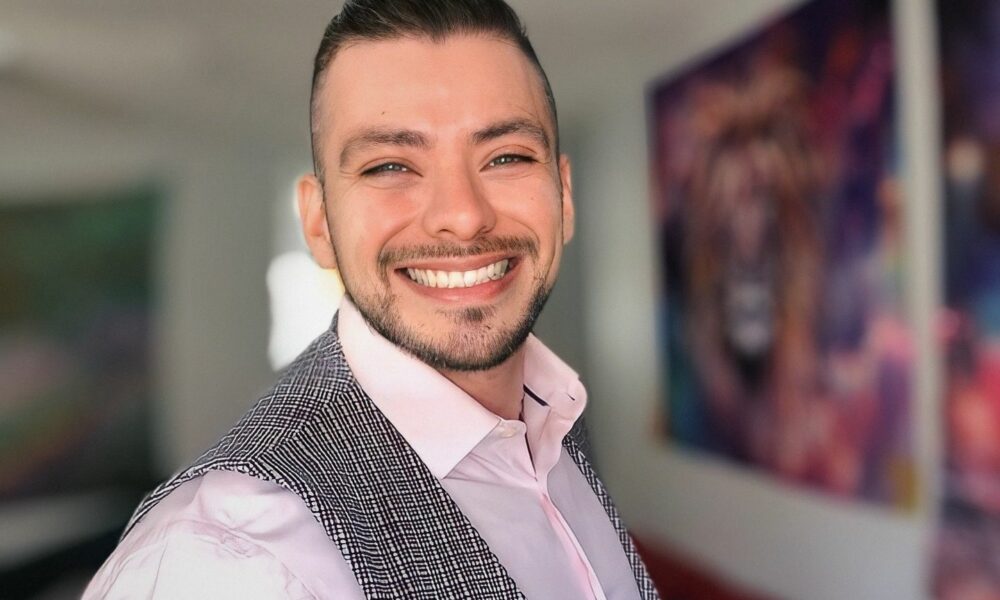Navigating Complexity: Insights into Global Supply Chains and Procurement of the Future

By Lisa Almore
In today’s fast-paced world of global trade, industry leaders are buzzing about the future of supply chains and procurement.
Amid geopolitical tensions, technological leaps, and environmental challenges, one voice rises above the rest: Dennis Hernandez. With over a decade in logistics and procurement, Hernandez is the go-to expert for tackling the complexities of modern supply chains.
“I love the continuous challenge of logistics. There is always something new to learn,” he shares.
Hernandez, a senior logistics consultant, has a wealth of experience in procurement and supply chain strategy. He previously served as the logistics supervisor for Suzano in North America, managing stevedoring, warehousing, transportation, and third-party logistics suppliers. He also implemented Electronic Data Interchange (EDI) setups with multiple suppliers, boosting automation and customer service.
He’s known for crafting detailed Request for Proposal (RFP) documents for terminal operators across North America, a vital part of Suzano’s operations. Hernandez is also a sustainability champion, having developed a carbon emissions measurement methodology in line with Greenhouse Gas Protocol (GHG) standards.
His passion for education is evident as he regularly conducts training sessions to enhance staff skills, ensuring seamless operations: “There is a constant evolution in this field of work, and learning keeps me motivated and excited about my career. I also love educating others so they can seek and achieve new possibilities and improve their skills. It means we can all grow and enhance not only our own performance but that of the company. And that of course results in a better customer experience,” he says.
During his tenure as Logistics Supervisor at Suzano, Hernandez optimized entry port configurations and established warehousing best practices, saving time and improving supplier management. At Blichmann Engineering, he expanded international markets and refined marketing strategies.
Hernandez holds a Fulbright Scholarship, an MBA from Purdue University’s Krannert School of Management, and a Master’s Degree in Finance and Global Business from the Institute of Business Administration and Economics in El Salvador. He’s certified in Business Strategy from Harvard University and Global Supply Chain Management from the GSCM Institute. Recently, he earned a merit-based membership as a Chartered Member of the Chartered Institute of Logistics and Transport (CMILT).
Hernandez sees global supply chains as the backbone of international trade, ensuring goods and services move smoothly across borders. This comes with many challenges, requiring him to communicate effectively with numerous companies.
“There’s always the need to understand global macro trends,” he explains. “You have to stay aware of events worldwide, not just in North America where I’m based. For example, container movements in Asia or trade disruptions in Europe can significantly impact our supply chains. Staying informed about global events, like potential railroad strikes in Canada, allows me to map risks and develop proactive risk management plans. This strategic planning is both challenging and rewarding.”
Working in a global role means Hernandez collaborates with multicultural teams, which he loves: “My company employs people from various nationalities, including the Philippines, India, South and Central America, Europe, and more. This diversity requires cognitive dexterity to navigate different cultural norms and communication styles,” he adds.
“For instance, when working with German colleagues, I send structured emails with bullet points and color-coded action items. In contrast, when dealing with teams in Mexico or Spain, it’s essential to build a personal connection by discussing family or other topics before diving into work-related matters. This cultural adaptability enriches our company’s dynamic and fosters a collaborative environment.”
Maintaining these relationships has been especially crucial in recent years, as disruptions have exposed vulnerabilities in traditional supply chain models. From the COVID-19 pandemic to geopolitical conflicts and climate change, these disruptions underscore the need for more resilient and adaptable supply chains.
Hernandez, known for his strategic vision and practical expertise, emphasizes that the future of global supply chains hinges on adaptability and innovation: “We are at a pivotal moment,” he says.
“The challenges we face today demand a fundamental rethinking of how we design and manage supply chains. It’s about building systems that are efficient but also resilient and sustainable.”
One key driver of change in global supply chains is technology. Innovations like artificial intelligence (AI), blockchain, and the Internet of Things (IoT) are revolutionizing how goods are tracked, managed, and delivered.
Hernandez highlights the transformative potential of these technologies: “Throughout my career in logistics, I’ve worked with numerous companies and systems, ranging from those still using manual processes like typewriters to those at the forefront of technology, incorporating AI into their operations,” he says.
“My goal has always been to integrate technology into my work. It is a game-changer for supply chains. AI and machine learning can optimize inventory management and demand forecasting, reducing waste and improving efficiency. Blockchain technology ensures transparency and traceability, which is crucial for maintaining ethical and sustainable practices.”
Hernandez has already integrated some cutting-edge tech into Suzano’s systems” “I’ve implemented Electronic Data Interchange (EDI) with various suppliers in the U.S.,” he shares.
“EDI lets different systems talk to each other seamlessly, cutting down on manual work and boosting automation. This means more efficient and accurate data transmission, like with barcode scanning, which reduces human error.”
One key insight he’s gained is that the best tech isn’t always the newest; it’s the one that works best across different systems: “For example, when dealing with outdated systems in ports for import and export documentation, it was crucial to understand and navigate these older systems despite their age,” he says.
“Adapting and using technology that all parties can work with is vital.”
As technology evolves, so does the role of supply chain professionals: “The future is about creating value and managing supply chains strategically, rather than getting bogged down by manual tasks,” Hernandez believes.
“By leveraging technology, supply chain pros can focus on innovation and optimization, driving greater efficiency in operations.”
He points to several successful implementations of these technologies. Blockchain, for instance, is being used to track the origins of raw materials, ensuring they are sourced responsibly.
“Blockchain is revolutionizing the tracking of raw materials by providing a transparent, unchangeable ledger,” he explains.
“This allows every step of the supply chain to be recorded and verified, from the origin of raw materials to their final destination.”
This visibility ensures ethical practices, prevents fraud, and maintains regulatory compliance: “Consumers can be more confident in the products they buy, knowing they come from responsible sources,” he adds.
IoT devices are another game-changer, offering real-time data on the condition and location of shipments, enabling more proactive supply chain management. “These devices let companies monitor things like temperature, humidity, and location throughout the supply chain,” Hernandez says.
“They ensure products are transported under optimal conditions, maintaining quality and reducing waste.” Real-time data collection helps companies address issues quickly, optimize routes, and improve logistics efficiency. For example, IoT sensors can alert supply chain managers to temperature deviations in perishable goods, allowing immediate action to prevent spoilage. This enhances operational efficiency and supports sustainable practices by reducing waste and improving energy use.
Sustainability is now a crucial aspect of modern supply chains. Consumers and stakeholders expect companies to take responsibility for their environmental and social impacts.
Hernandez is a strong advocate for integrating sustainability into every part of supply chain management: “Sustainable supply chains aren’t just about reducing environmental impact; they’re about creating value for all stakeholders,” he asserts.
“This means ethical sourcing, cutting carbon footprints, and ensuring fair labor practices. Companies that embrace sustainability will thrive in the long run.”
He adds: “I believe sustainability will shape the future of our industry, especially for those of us in emissions-related sectors. Keeping up with trends and regulations in sustainability is crucial. Understanding how we, as a company and as individuals, can minimize our environmental impact is a major focus of my work. It’s rewarding to find ways to optimize our transportation methods to reduce our emissions footprint.”
Hernandez emphasizes the importance of collaboration in achieving sustainability goals: “No single company can do it alone,” he says. “It requires partnerships across the supply chain—from suppliers to customers and even competitors. Together, we can create more sustainable and resilient supply chains.”
Resilience is a big deal for Hernandez when it comes to the future of supply chains. The COVID-19 pandemic showed just how fragile global supply networks can be, with many companies struggling to handle sudden disruptions.
“The biggest stress in my work often comes from unexpected disruptions,” he says. “While risk management helps us foresee and prepare for many issues, there are always factors we can’t predict. These surprises require immediate attention and quick problem-solving to keep the supply chain running smoothly.”
Hernandez is all about building stronger supply chains that can handle shocks and adapt to changing conditions: “Resilience is about being ready for the unexpected,” he says. “This means diversifying suppliers, investing in local and regional logistics, and using digital tools to boost visibility and agility.”
He also emphasizes scenario planning and risk management to build resilient supply chains: “Companies need to anticipate potential disruptions and have backup plans ready,” he says. “This proactive approach can help reduce risks and ensure operations continue smoothly.”
While tech and innovation are crucial, Hernandez also highlights the importance of the human element in supply chain management: “At the end of the day, supply chains are about people,” he says.
“It’s about our relationships with suppliers, partners, and customers. Effective communication and collaboration are essential for success.”
As a result. negotiation is a significant part of his role: “I frequently negotiate with suppliers for logistics procurement. I strive for transparency, ensuring both parties understand each other’s perspectives and work toward mutually beneficial outcomes. Building long-term partnerships based on trust and shared value is crucial. That human element is key to securing positive results.”
Hernandez also stresses the need to invest in talent and develop the skills needed for the future of supply chains: “We need to attract and retain the best talent in the industry. This means providing ongoing training and development opportunities and fostering a culture of innovation and continuous improvement.”
Stefan Braren Damato, Logistics Procurement Manager for Suzano, has worked with Hernandez since 2019: “Dennis has always been outstanding in his logistics knowledge,” he says.
“For example, in 2019, he was sent to Brazil to budget for the US office. Even our peers in Brazil recognized his importance, noting that he handled almost everything related to US operations. He’s talented, skilled, and constantly seeks to expand his knowledge and improve himself. He’s also passionate about enhancing our work environment and pushing for sustainability initiatives.”
Raymond Medley, North American Pulp Commercial Manager for Suzano America, adds: “Dennis has implemented numerous creative strategies. During the global shipping crisis, he expanded these strategies to other locations. He has improved service, optimized costs, and developed systems for better service and faster deliveries.
“Dennis brings immense value to the people he works with. His knowledge and experience in logistics and procurement help create better and more sustainable systems and services.”
Hernandez remains optimistic about the potential of global supply chains to drive positive change: “The challenges we face are significant, but so are the opportunities,” he concludes.
“By embracing technology, prioritizing sustainability, and building resilience, we can create supply chains that are efficient, ethical, and adaptable.”
Hernandez’s insights offer a valuable roadmap for navigating the complexities of modern supply chains. His emphasis on innovation, sustainability, and resilience reflects a forward-thinking approach essential for success in today’s dynamic global environment. As businesses continue to adapt to changing conditions, the guidance of experts like Hernandez will be crucial in shaping the future of procurement and logistics.
“My experiences have taught me the value of organization, cultural adaptability, and lifelong learning,” he concludes.
“By leveraging these skills, I can effectively manage the complexities of logistics and contribute to the success of my team and company. As the world faces new challenges and opportunities, staying informed, organized, and adaptable will be key to thriving in this dynamic field.”






